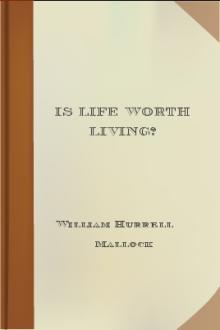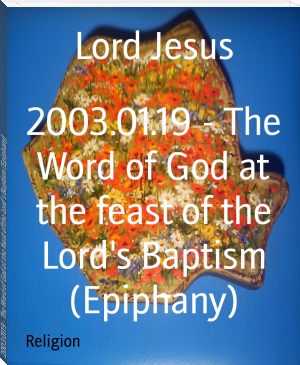Is Life Worth Living? by William Hurrell Mallock (best ereader for textbooks TXT) 📕

- Author: William Hurrell Mallock
- Performer: -
Book online «Is Life Worth Living? by William Hurrell Mallock (best ereader for textbooks TXT) 📕». Author William Hurrell Mallock
Project Gutenberg's Is Life Worth Living?, by William Hurrell Mallock
This eBook is for the use of anyone anywhere at no cost and with
almost no restrictions whatsoever. You may copy it, give it away or
re-use it under the terms of the Project Gutenberg License included
with this eBook or online at www.gutenberg.net
Title: Is Life Worth Living?
Author: William Hurrell Mallock
Release Date: December 2, 2005 [EBook #17201]
Language: English
*** START OF THIS PROJECT GUTENBERG EBOOK IS LIFE WORTH LIVING? ***
Produced by David Garcia, Stacy Brown Thellend and the
Online Distributed Proofreading Team at http://www.pgdp.net
IS LIFE WORTH LIVING? BY WILLIAM HURRELL MALLOCK AUTHOR OF 'THE NEW REPUBLIC' ETC.
'Man walketh in a vain shadow, and disquieteth himself in vain.'
'How dieth the wise man? As the fool.... That which befalleth the sons of men befalleth the beasts, even one thing befalleth them; as the one dieth so dieth the other, yea they have all one breath; so that man hath no preeminence above a beast; for all is vanity.'
'ταλαιπωρος εγω ανθρωπος, τις με ρυδεται εκ του σωματος του θανατου τουτου;'
NEW YORKG. P. PUTNAM'S SONS
182 Fifth Avenue
1879 I INSCRIBE THIS BOOK TO JOHN RUSKIN TO JOHN RUSKIN.
My dear Mr. Ruskin,—You have given me very great pleasure by allowing me to inscribe this book to you, and for two reasons; for I have two kinds of acknowledgment that I wish to make to you—first, that of an intellectual debtor to a public teacher; secondly, that of a private friend to the kindest of private friends. The tribute I have to offer you is, it is true, a small one; and it is possibly more blessed for me to give than it is for you to receive it. In so far, at least, as I represent any influence of yours, you may very possibly not think me a satisfactory representative. But there is one fact—and I will lay all the stress I can on it—which makes me less diffident than I might be, in offering this book either to you or to the world generally.
The import of the book is independent of the book itself, and of the author of it; nor do the arguments it contains stand or fall with my success in stating them; and these last at least I may associate with your name. They are not mine. I have not discovered or invented them. They are so obvious that any one who chooses may see them; and I have been only moved to meddle with them, because, from being so obvious, it seems that no one will so much as deign to look at them, or at any rate to put them together with any care or completeness. They might be before everybody's eyes; but instead they are under everybody's feet. My occupation has been merely to kneel in the mud, and to pick up the truths that are being trampled into it, by a headstrong and uneducated generation.
With what success I have done this, it is not for me to judge. But though I cannot be confident of the value of what I have done, I am confident enough of the value of what I have tried to do. From a literary point of view many faults may be found with me. There may be faults yet deeper, to which possibly I shall have to plead guilty. I may—I cannot tell—have unduly emphasized some points, and not put enough emphasis on others. I may be convicted—nothing is more likely—of many verbal inconsistencies. But let the arguments I have done my best to embody be taken as a whole, and they have a vitality that does not depend upon me; nor can they be proved false, because my ignorance or weakness may here or there have associated them with, or illustrated them by, a falsehood. I am not myself conscious of any such falsehoods in my book; but if such are pointed out to me, I shall do my best to correct them. If what I have done prove not worth correction, others coming after me will be preferred before me, and are sure before long to address themselves successfully to the same task in which I perhaps have failed. What indeed can we each of us look for but a large measure of failure, especially when we are moving not with the tide but against it—when the things we wrestle with are principalities and powers, and spiritual stupidity in high places—and when we are ourselves partly weakened by the very influences against which we are struggling?
But this is not all. There is in the way another difficulty. Writing as the well-wishers of truth and goodness, we find, as the world now stands, that our chief foes are they of our own household. The insolence, the ignorance, and the stupidity of the age has embodied itself, and found its mouthpiece, in men who are personally the negations of all that they represent theoretically. We have men who in private are full of the most gracious modesty, representing in their philosophies the most ludicrous arrogance; we have men who practise every virtue themselves, proclaiming the principles of every vice to others; we have men who have mastered many kinds of knowledge, acting on the world only as embodiments of the completest and most pernicious ignorance. I have had occasion to deal continually with certain of these by name. With the exception of one—who has died prematurely, whilst this book was in the press—those I have named oftenest are still living. Many of them probably are known to you personally, though none of them are so known to me; and you will appreciate the sort of difficulty I have felt, better than I can express it. I can only hope that as the falsehood of their arguments cannot blind any of us to their personal merits, so no intellectual demerits in my case will be prejudicial to the truth of my arguments.
To me the strange thing is that such arguments should have to be used all; and perhaps a thing stranger still that it should fall to me to use them—to me, an outsider in philosophy, in literature, and in theology. But the justification of my speaking is that there is any opening for me to speak; and others must be blamed, not I, if
Degenerates into hands like mine.
At any rate, however all this may be, what I here inscribe to you, my friend and teacher, I am confident is not unworthy of you. It is not what I have done; it is what I have tried to do. As such I beg you to accept it, and to believe me still, though now so seldom near you,
Your admiring and affectionate friend,
W. H. MALLOCK.
P.S.—Much of the substance of the following book you have seen already, in two Essays of mine that were published in the 'Contemporary Review,' and in five Essays that were published in the 'Nineteenth Century.' It had at one time been my intention, by the kindness of the respective Editors, to have reprinted these Essays in their original form. But there was so much to add, to omit, to rearrange, and to join together, that I have found it necessary to rewrite nearly the whole; and thus you will find the present volume virtually new.
Torquay, May, 1879.
CONTENTSCHAPTER I.
THE NEW IMPORT OF THE QUESTION.
CHAPTER II.
MORALITY AND THE PRIZE OF LIFE.
CHAPTER III.
SOCIOLOGY AS THE FOUNDATION OF MORALITY.





Comments (0)